Fantastic, August 1961: A Retro-Review
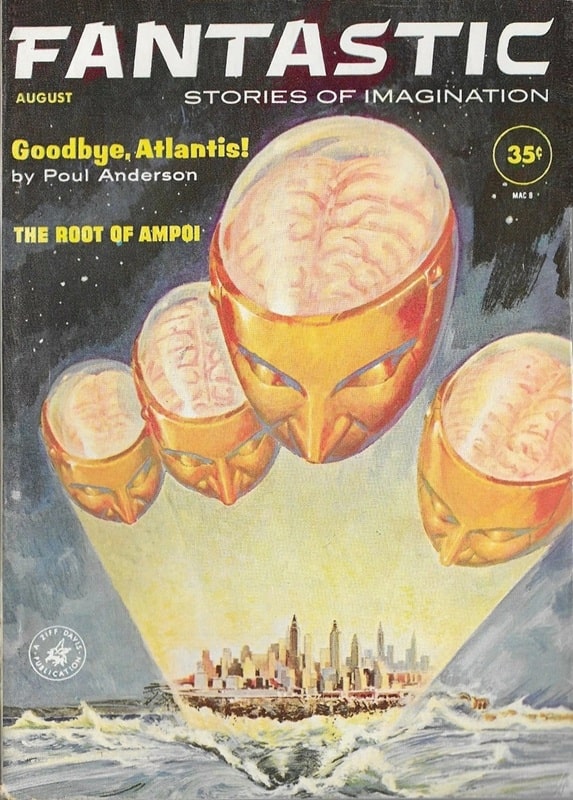 |
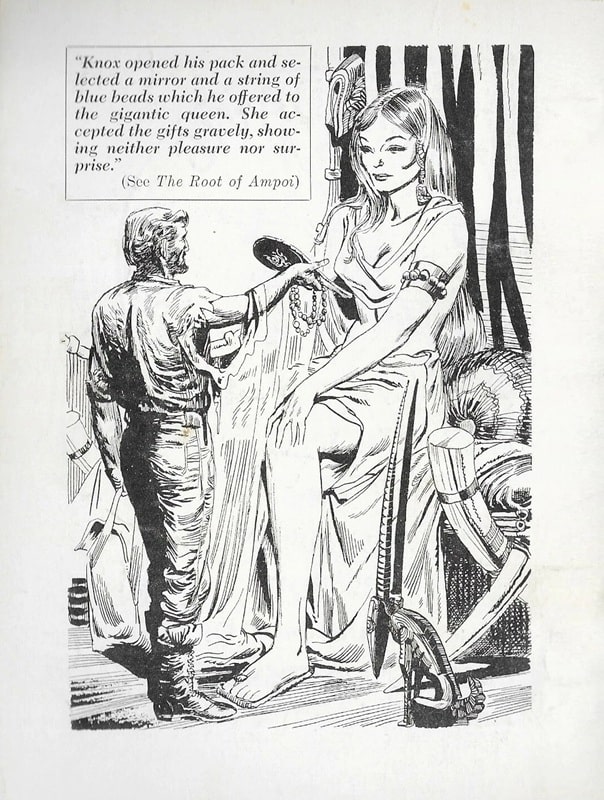 |
Fantastic, August 1961. Cover by Leo Summers
It’s been a long time since I did a Retro-Review from Cele Goldsmith’s time at Amazing/Fantastic. So I’m happy to be back at it! This issue is from about two years into Goldsmith’s tenure.
There are two features — Norman Lobsenz’s editorial, and the letter column, According to You. (Well, and a brief Coming Soon piece.) The editorial talks about using computers to analyze the various items certain Thais believe have magical powers, ending with a slight joke about hoping to find a love philtre “for Cele.” It introduces the concept by talking about the famous Arthur C. Clarke story in which a computer helps Tibetan monks list all the names of god — but misidentifies the story weirdly by adding another billion names: “The Ten Billion Names of God.”
[Click the images for fantastic versions.]
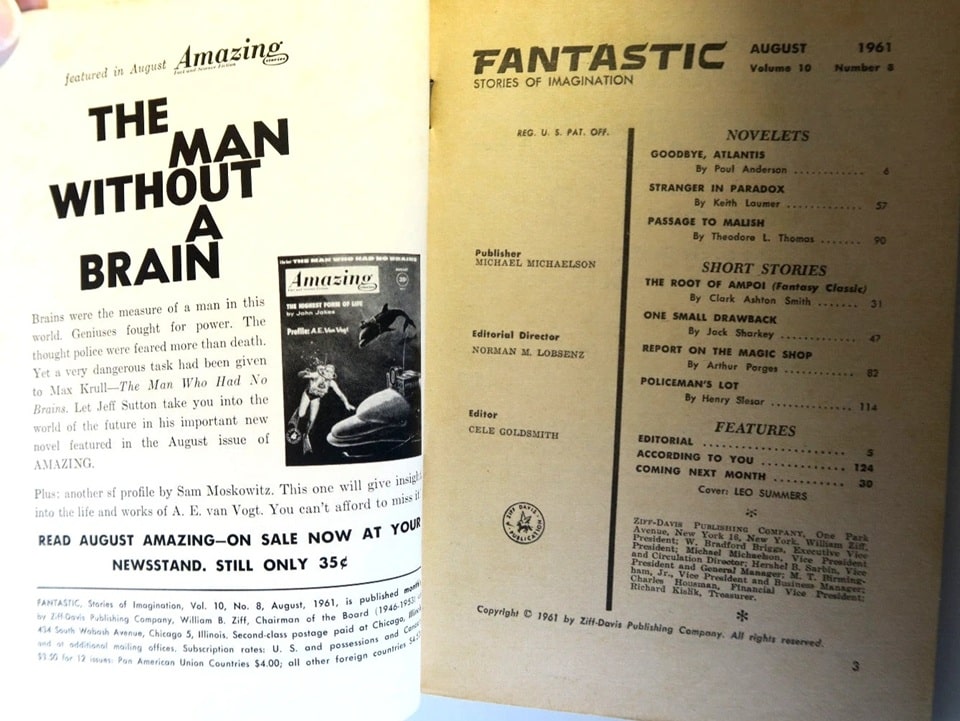
According to You has six letters. I recognized some well-known fans: Bill Bowers and Redd Boggs were both prolific fanzine editors and multiple Hugo nominees. Lawrence Crilly, John Pocsik, and David Charles Paskow are not as was well known but do get mentions in Fancyclopedia 3, and indeed the Paskow Collection at Temple University is named for David Paskow. F. C. MacKnight is the other contributor.
The letters concern mostly Fritz Leiber and the newly instituted use of one reprint per issue — both get praise. David Bunch is of course mentioned — negatively by Bowers and positively by Paskow (the latter mention getting this relieved comment from Goldsmith: “We figured that if we kept publishing [Bunch], somebody sooner or later would agree with us that he has something in his stories.”)
The cover is by Leo Summers, the interiors are by Summers, Virgil Finlay, West, Dan Adkins, and Larry Ivie, with a Summers back cover based on the Smith story, and one cartoon by Frosty.
The stories, then.
Novelets
“Goodbye, Atlantis!,” by Poul Anderson (9,000 words)
“Stranger in Paradox,” by Keith Laumer (9,200 words)
“Passage to Malish,” by Theodore L. Thomas (9,000 words)
Short Stories
“The Root of Ampoi,” by Clark Ashton Smith (5,900 words)
“One Small Drawback,” by Jack Sharkey (3,800 words)
“Report on the Magic Shop,” by Arthur Porges (3,000 words)
“Policeman’s Lot,” by Henry Slesar (3,600 words)
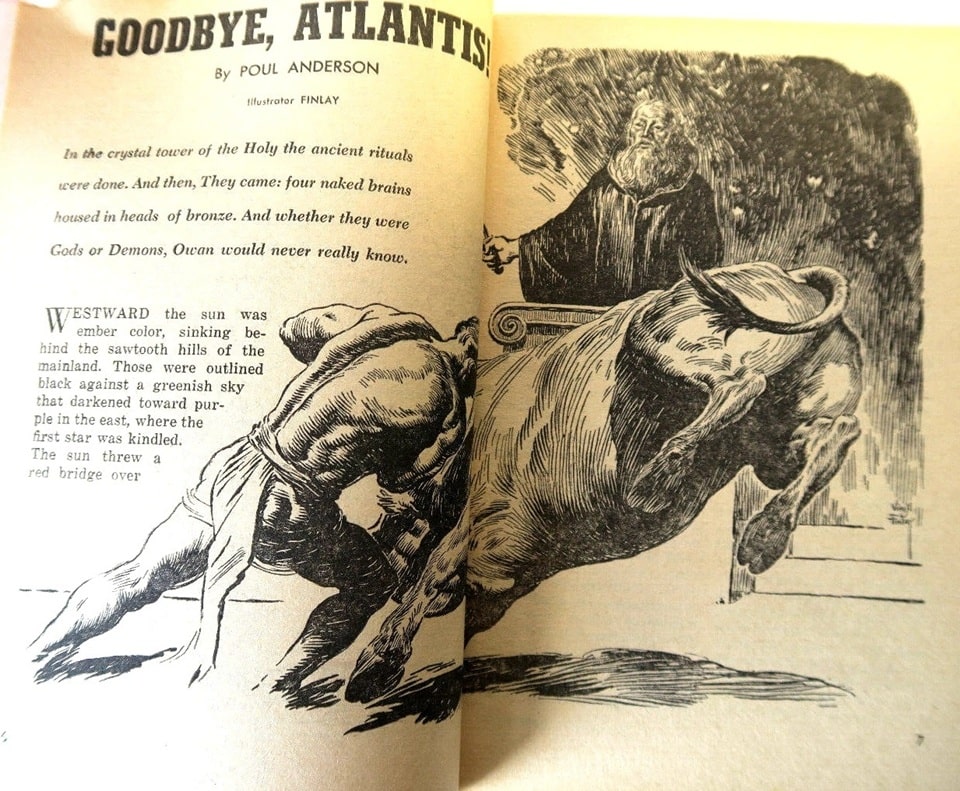
“Goodbye, Atlantis!” is a very obscure Anderson story — it’s only ever been reprinted once, in one of Sol Cohen’s super cheap and ugly all-reprint magazines, which mostly or entirely mined the Amazing/Fantastic backlist for material (and reprinted it (legally) without pay until SFWA objected, after which apparently Cohen made nominal payments.)
The lack of reprints is a bit odd, because “Goodbye, Atlantis!” isn’t terrible. It’s no lost classic, but it’s fine. The viewpoint character is Owan, a guard Captain in the retinue of the nobleman Donwirel and his wife Rianna, who is the niece of the former king of Atlantis, and thus cousin to the current king. Owan is in love with the beautiful Rianna, but at this time the concern is that there is a rebellion against the new king.
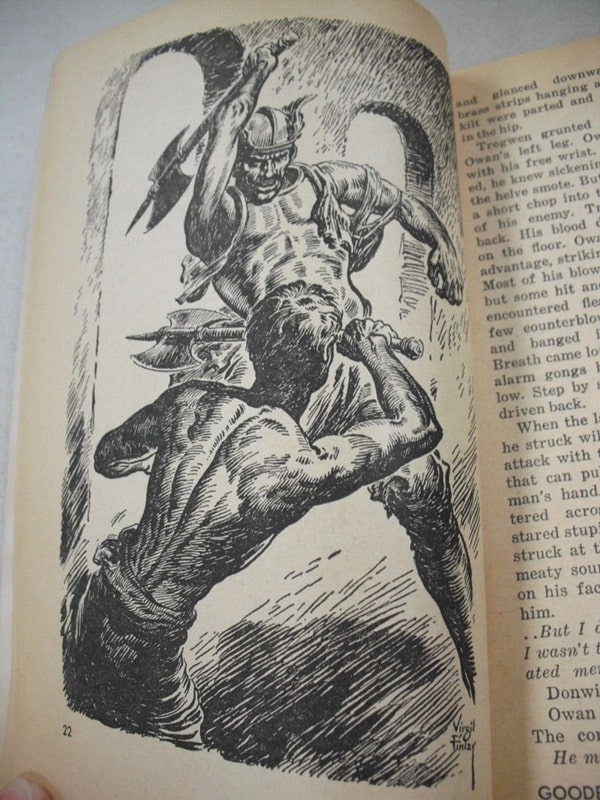
The plot turns on the efforts of the Archpriest Govandon to summon the long absent gods of Atlantis to vanquish the rebels, who are clearly winning the war and have the capitol under siege. Owan has concerns — he doesn’t trust the gods, or perhaps simply doesn’t trust that Govandon’s spells will work. He goes to attend Donwirel, who is working with Govandon — and is poisoned.
It’s clear that Donwirel is a traitor, and only Rianna’s timely intervention saves Owan, after which he struggles to prevent Donwirel from stealing the spells Govandon has learned. There’s some solid action, and Owan (and Rianna) are successful — but their success proves profoundly ambiguous. (Behind it all is a sly suggestion that the rebels were right all along.)
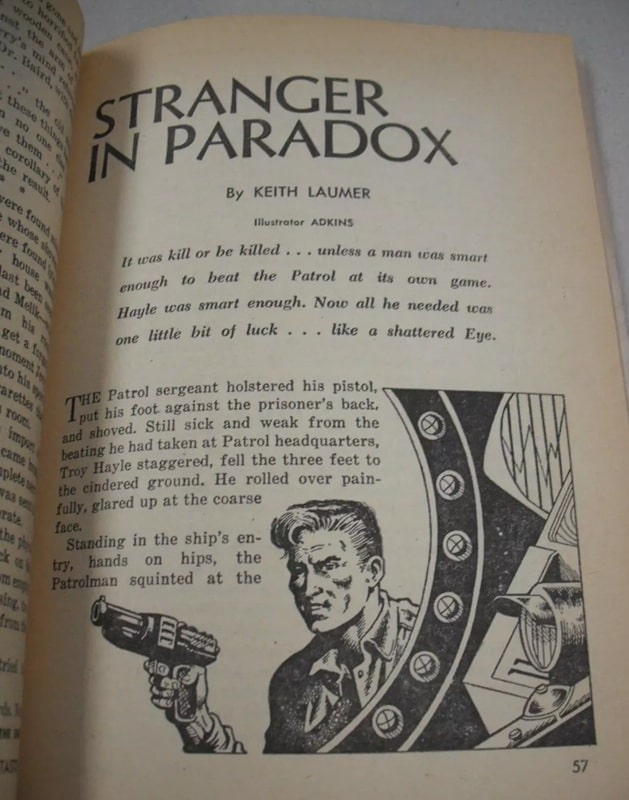
“Stranger in Paradox” was, I think, Keith Laumer’s fourth published story. The first two, “Greylorn” and “Diplomat-at-Arms” were published by Goldsmith as well — Laumer was one of her major discoveries, along with Le Guin, Disch, Zelazny and to some extent Ballard (for the American market.) The Retief stories (after “Diplomat-at-Arms”) ended up finding a home in Frederik Pohl’s If, but Goldsmith otherwise published a great deal of Laumer’s early work.
Alas, “Stranger in Paradox” is pretty awful. Hayle is dumped on the title planet by the Patrol, who seem to be the agents of the despotic rulers of this future. (Details are pretty slight.) They leave him nothing but a short sword and a reusable match. The only rule on Paradox is that prisoners cannot cooperate — they must either avoid each other or fight.
Hayle’s plan is to somehow convince a couple of other people to cooperate, and after figuring out how the Patrol keeps track of the prisoners, he manages that … and then, with a profoundly implausible plot, lots of luck, a woman prisoner falling into their laps, and utterly ridiculous concept of both how the Patrol would work and how they control civilization, they succeed. It’s just dumb dumb dumb the whole way, redeemed only slightly by the fight scenes that are, as usual, quite good — Laumer had the knack of writing fights.
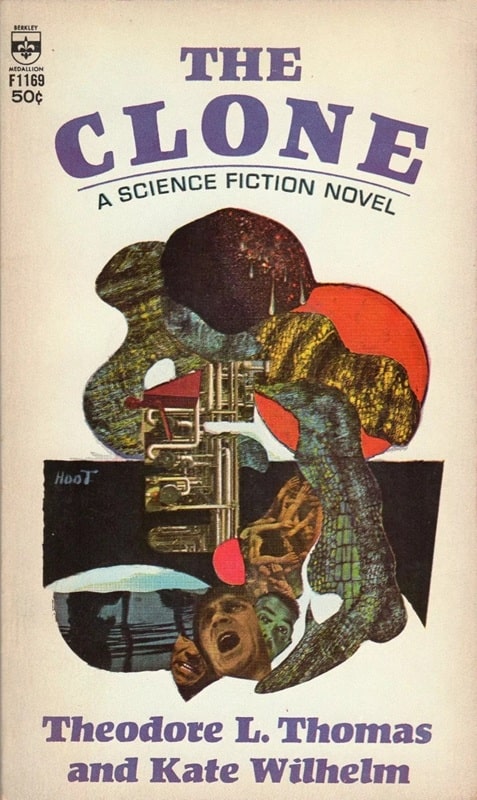 |
 |
The Clone by Theodore L. Thomas and Kate Wilhelm
(Berkley Medallion, December 1965). Cover by Hoot von Zitzewitz
Theodore L. Thomas (1920-2005) was a chemical engineer and patent attorney who wrote about 50 short stories between 1952 and 1981. He wrote two novels in collaboration with Kate Wilhelm (The Clone and The Year of the Cloud.) He is probably best known still for a series of stories he wrote as “Leonard Lockhard” about science fictional complications with patents — the first two of these in collaboration with fellow patent attorney Charles Harness; and for his story “The Weather Man,” about human control of the weather.
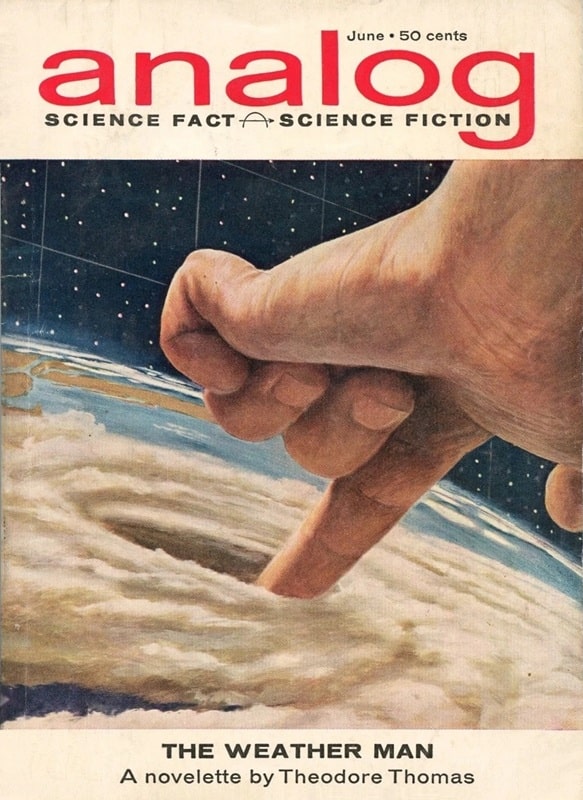
“Passage to Malish” is about a salesman who finds himself diverted from his trip to the planet Malish because it’s been determined that he’s the perfect person to confront the visiting aliens from the Large Magellanic Cloud. The solution involves turning him into a superhuman, committing genocide (or galactocide, I suppose), and then hoping he’ll consent to being turned back to a normal human before he uses his powers to subvert the Milky Way. I never believed any of this story for a second.
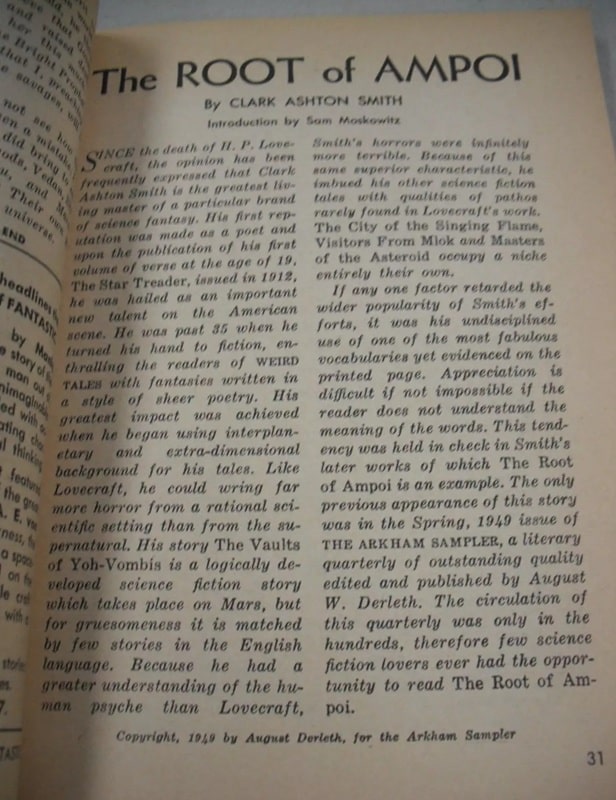 |
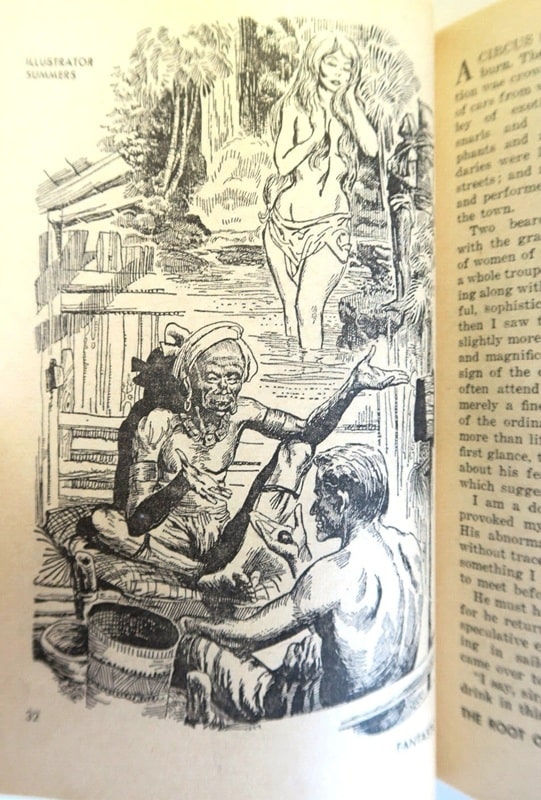 |
“The Root of Ampoi” by Clark Ashton Smith. Illustration by Summers
“The Root of Ampoi” is Sam Moskowitz’s choice for this month’s fantasy reprint. Clark Ashton Smith (1893-1961) was a poet and a writer of weird fiction whose reputation has gone up and down over time, and seems on the upside now. He was a regular contributor to Weird Tales, and part of Lovecraft’s circle. He was known for his ornate prose and extravagant imagination, so, Moskowitz, with his impeccable as ever taste, declaring in more or less Salieri mode that Smith used “too many words” (that’s my paraphrase of Moskowitz’ words) chose a completely uncharacteristic story to reprint. (That said, it has been reprinted fairly often, one time as “The Ampoi Giant,” so other people may disagree with me.)
“The Root of Ampoi” is a tale told by a giant working for a circus. He was a sailor, and he heard of a place on New Guinea where the men were normal sized and the women were nine feet tall. And there were rubies to be had for a song. Seeking to make his fortune, he finds this place, and learns about the secret that makes the women so tall — after the queen of those women chose him for a consort. But, unhappy with being dominated by a much larger wife, he ferrets out the secret… the punishment for which is banishment. No rubies either. But — easy to find circus work. This is really minor stuff — a competently executed tall tale, really. But it seems nothing like a real introduction to CAS.
Jack Sharkey (1931-1992) was a Cele Goldsmith regular, though to my taste he was a pretty weak writer. “One Small Drawback,” however, is not too bad at its length. Jerry, a college kid, is intrigued by his professor’s research into telekinesis, but nothing he tries has any effect. His professor is convinced that what he needs is true belief. Then something small happens that convinces Jerry he can use telekinesis… but it doesn’t work consistently. The key element he eventually discovers is pretty clever, and effectively dark.
Arthur Porges (1915-2006) wrote over 200 stories, split roughly 50/50 between mystery and SF. His stories were mostly fairly short, and were consistently clever, sometimes amusing, sometimes quite mordant. As a writer of exclusively short fiction, he’s not really widely remembered, but he was one of the most dependably enjoyable writers in the field, and his contributions appeared right up until his death, mostly in F&SF but also in Goldsmith’s magazines. “Report on the Magic Shop” is good solid fun, nothing earth-shattering, written as if the author is telling the editors about the various products sold at a magic shop he happened to stumble into.
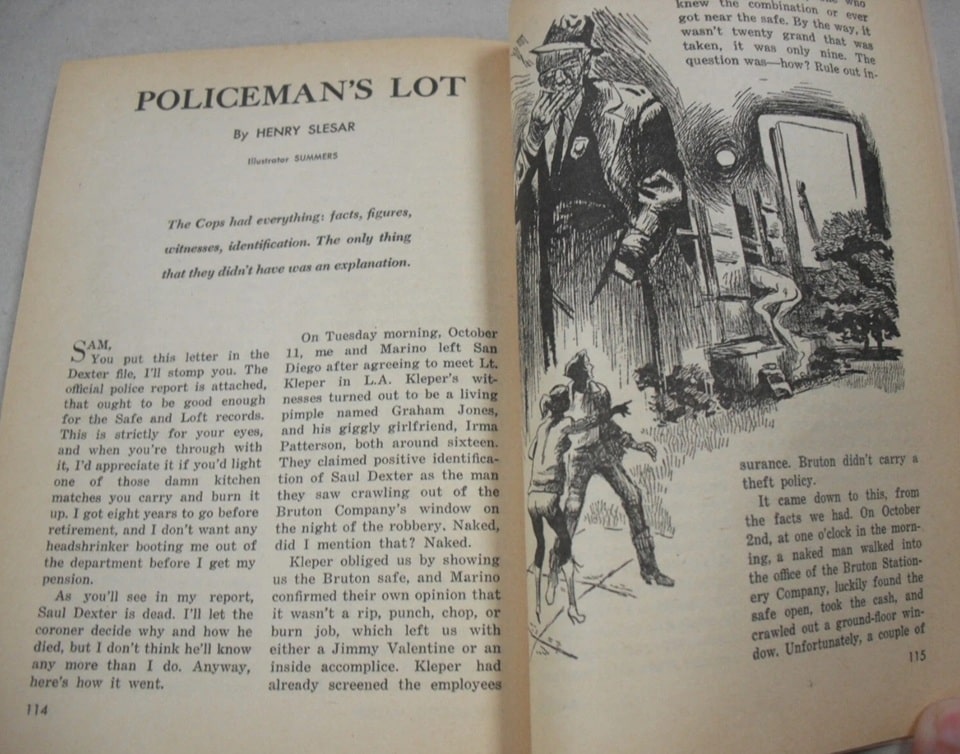
Henry Slesar (1927-2002) was another writer of both SF and crime fiction, with most of his SF fairly short. He was better known as a mystery writer, and so perhaps it isn’t a surprise that “Policeman’s Lot” is basically a mystery, though with a fantastical solution.
A veteran patrolman submits a report on a strange case he recently investigated, involving a couple of basically “locked room” thefts, in which in one case a man was found escaping from a window naked. Not long after, the man is found crushed to death in his house. The strange factor is that he seems to have changed height between separate arrests. The solution is kind of obvious, and acceptable except as an explanation of his death.
Rich Horton’s last article for us was We Are Missing Important Science Fiction Books. His website is Strange at Ecbatan. Rich has written over 200 articles for Black Gate, see them all here.